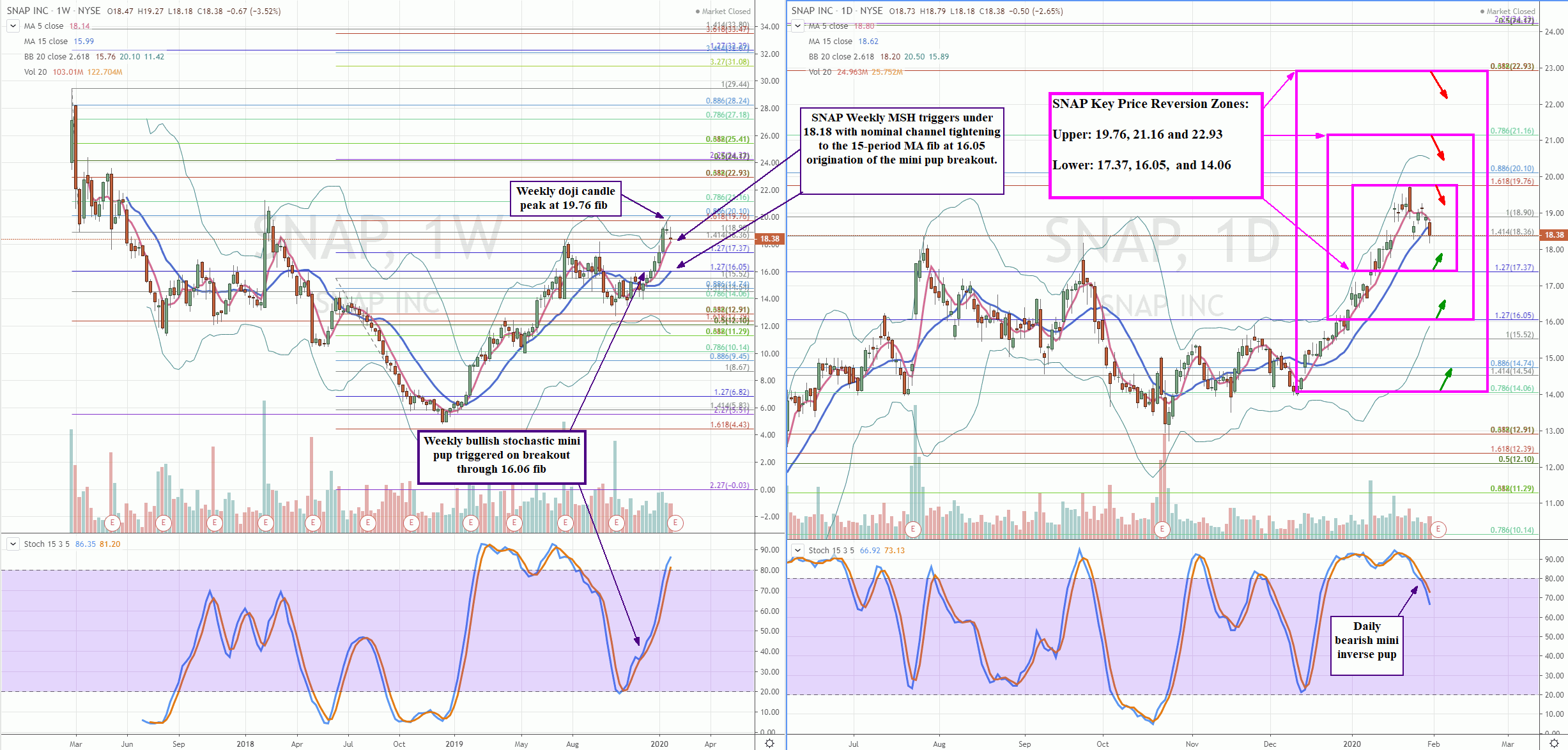Social media platform Snap, Inc.
NASDAQ: SNAP reports Q4 2019 earnings after the close on Tuesday, Feb. 4, 2020. Analysts expect $0.86-earnings per share (EPS) on revenues of $561.63 million. Shares have been on a tear as SNAP found a resurgence of interest skimming market share from Facebook
NYSE: FB and Twitter
NASDAQ: TWTR. SNAP establishing itself as a viable alternative social media platform finding a niche within the Generation Z demographic. SNAP has galvanized improved monetization drivers enabling easier on-boarding for new advertisers and bolstering Return on Ad Spending (RAS) visibility with direct response advertising products. Entire retail catalogs can be indexed enabling advertisers to seamlessly create and measure the effectiveness of SNAP ads. Investor sentiment will be critical as SNAP paints itself as a revived social platform delivering improved visibility and value.
Macro Context and Influences
The S&P 500 ETF NYSEARCA: SPY is our macro market indicator. A heavy bearish risk-off sentiment comes into the week fueled by continued impact of the Coronavirus, interest rate inversions and ripples from the unforeseen drop in the Chicago PMI to 42.9 versus estimates of 48.9, the lowest reading since Dec. 2015. China’s oil demand surprisingly collapsed by nearly 20-percent as a result of the Coronavirus and over 60-million quarantined citizens. Fears of a pandemic could pose a systemic risk which can take priority price action over earnings results in some cases. This means strong earnings could get a muzzled upside reaction and weak earnings could face a harsher sell-off than normal. On the flip side, a market rebound could spread upside momentum that could bolster positive earnings reaction and mitigate weak guidance and 318.80 Fibonacci (fib) reversion levels and daily lower Bollinger Bands (BBs), respectively. Negative macro market sentiment can trigger further selling on WDC and blunt upside momentum.

Technical Analysis
Utilizing the rifle charts, SNAP triggered a weekly bullish mini pup in December 2019 on the breakout through the 16.06 Fibonacci (fib) level triggering a short-squeeze that peaked at the 19.76 fib on a weekly doji candle. This sets the market structure high (MSH) stop trigger above 19.76 and the weekly MSH sell trigger under 18.18. The combination of the weekly MSH trigger daily bearish mini inverse pup sets the logical reversion target area at the 16.05 fib, the origination of the weekly mini pup breakout. The nominal upside may be limited to the 20.50 daily upper BBs and 20.10 fib at the weekly upper BBs. This doesn’t rule out the potential for an escalated short-squeeze to propel shares to the 21.16 and 22.95 super fib as market may assign a new pricing model for shares closer to the IPO highs.
Sympathy Stocks:
As a distant third among publicly traded U.S. social media platform, SNAP usually tends to follow the leaders Facebook NYSE: FB and Twitter NASDAQ: TWTR. However, there are situations where the tail can wag the dog if there is an extensive price move or gap. Potential data privacy issues plaguing Facebook is also a threat for SNAP especially regarding COPPA violations particularly due to the SNAP’s younger audience.
Behavior Changes with Higher Share Pricing
SNAP is a very thick and liquid trading stock, which usually results in smaller price moves and ranges. During regular trading days, scalps can range from 0.05 to 0.20. While the price moves may be smaller, the thick liquidity enables larger share sizing. The velocity of price moves increases as share price rises. New buyers take out old sellers which thins out the liquidity. This is important to keep in mind if SNAP manages to break out above 20.50 upper sticky 5’s range. In addition to the expected acceleration of price action, higher prices thins out liquidity resulting in larger price swings.
Trading Game Plan:
The two most volatile price action periods will be on the initial post-market earnings release and the morning session at the opening bell. Reversion price levels to short-sell on the initial tests are 19.76 fib, 20.60 stinky 5’s, 21.16 fib and 22.93 super fib. Reversion price levels to bounce for a bounce sit at 17.37 fib, 16.05 fib, 15.40 stinky 5s, 14.06 fib. Seasoned traders can envelop the key price reversion zones with limit orders during those two trading periods. The reversion trading is meant for quick scalps playing the second reaction on the gap patterns. Don’t get complacent giving up quick profits on the second reaction only to get trapped by the third and trending reaction, especially if it turns into a slow grind.
Before you make your next trade, you'll want to hear this.
MarketBeat keeps track of Wall Street's top-rated and best performing research analysts and the stocks they recommend to their clients on a daily basis.
Our team has identified the five stocks that top analysts are quietly whispering to their clients to buy now before the broader market catches on... and none of the big name stocks were on the list.
They believe these five stocks are the five best companies for investors to buy now...
See The Five Stocks Here
Unlock your free copy of MarketBeat's comprehensive guide to pot stock investing and discover which cannabis companies are poised for growth. Plus, you'll get exclusive access to our daily newsletter with expert stock recommendations from Wall Street's top analysts.
Get This Free Report
Like this article? Share it with a colleague.
Link copied to clipboard.